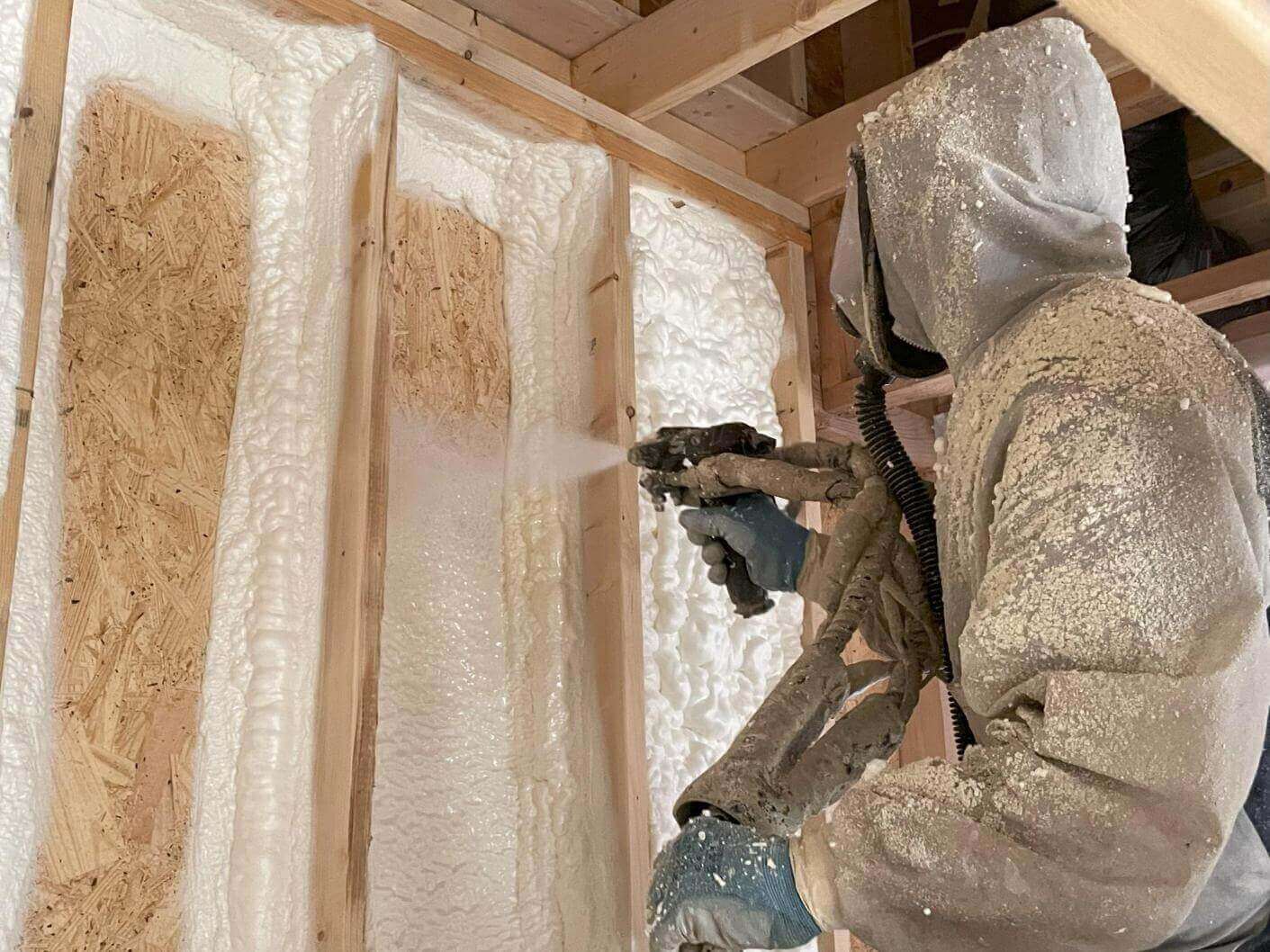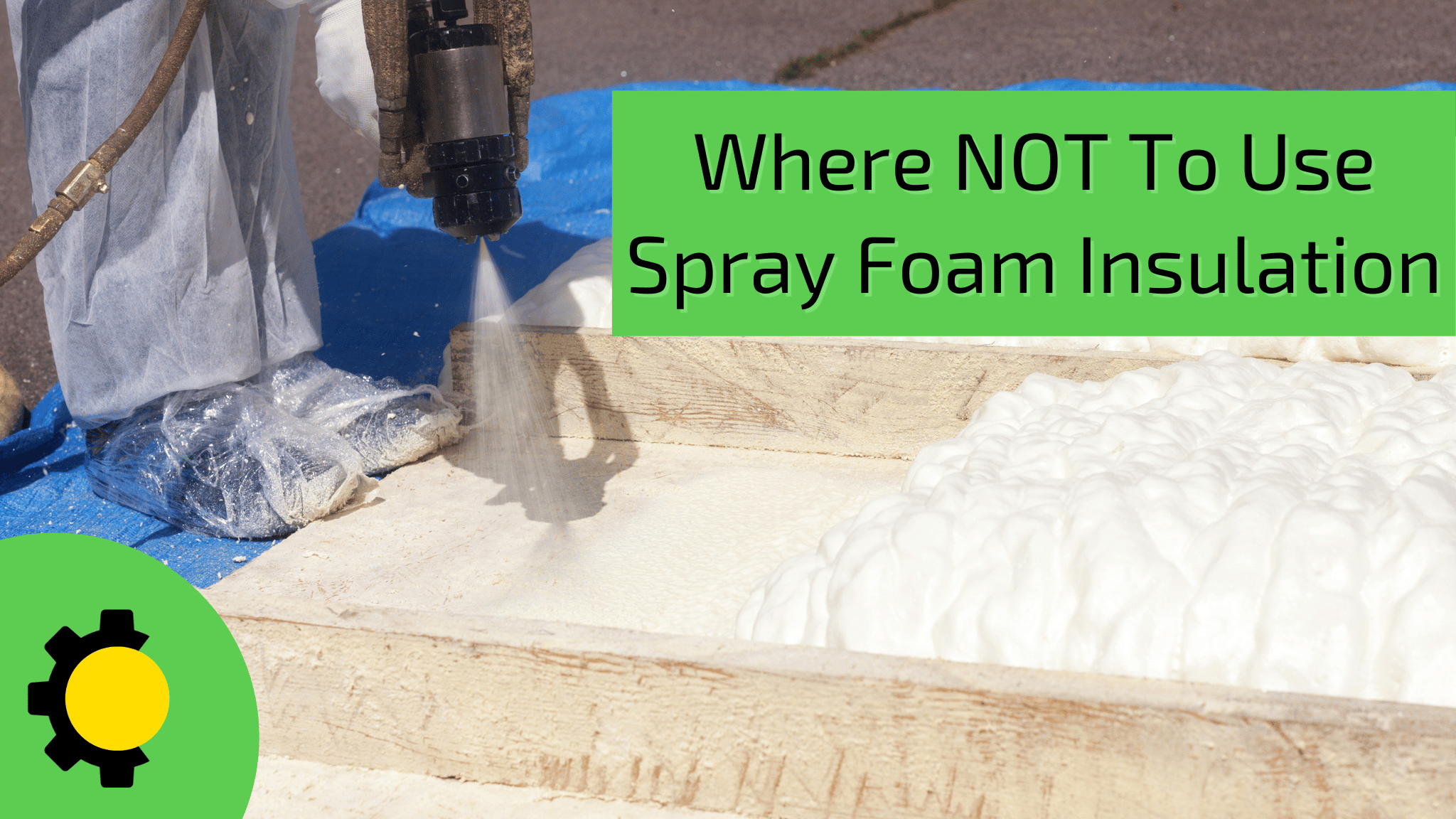Frequently Asked Questions Concerning Spray Foam Installation and Usage
Frequently Asked Questions Concerning Spray Foam Installation and Usage
Blog Article
Just How Spray Foam Can Enhance Energy Effectiveness in Any Structure
Spray foam insulation has arised as a critical solution for enhancing energy efficiency throughout various structure types. By producing an airtight seal that minimizes air leak, it efficiently manages interior climates while dramatically minimizing heating & cooling expenses. Furthermore, its remarkable R-value and moisture-resistant buildings add to long-term power savings and enhanced structure longevity. As residential or commercial property proprietors increasingly seek lasting options, the implications of spray foam insulation expand beyond mere utility cost savings. The full scope of its benefits, nevertheless, warrants a better examination of exactly how it can change energy monitoring methods in both domestic and business settings.
Comprehending Spray Foam Insulation
Spray foam insulation is increasingly identified for its remarkable thermal performance and flexibility in various applications. Composed mostly of polyurethane, this insulation product is applied as a fluid that expands upon call, filling up spaces and producing a smooth obstacle. This distinct home allows spray foam to satisfy irregular surfaces, making it a perfect selection for both commercial and residential structures.

Application of spray foam insulation is generally carried out by qualified specialists utilizing customized devices, making certain optimum efficiency and safety and security - Spray Foam. The curing process is rapid, enabling for quick installation and marginal disruption. Consequently, spray foam insulation is increasingly being utilized in new building and retrofitting projects due to its capacity to improve architectural stability while improving general energy performance in buildings
Advantages of Power Effectiveness
Power effectiveness plays a pivotal function in reducing functional costs and reducing environmental impact throughout various fields. By enhancing energy usage, house owners and businesses can achieve substantial financial savings on utility bills, which straight boosts financial efficiency. Reliable power usage means much less dependence on fossil fuels, thereby adding to a reduction in greenhouse gas discharges and advertising an extra sustainable setting.
Furthermore, energy-efficient structures commonly experience increased residential or commercial property worths. As energy prices rise and sustainability comes to be a priority for customers, homes with enhanced energy performance attributes are much more eye-catching on the market. This fad motivates investment in energy-saving technologies, which can further drive innovation and financial development.
Along with economic and environmental advantages, energy effectiveness can likewise enhance the total comfort and health and wellness of interior areas. Proper insulation and reliable heating and cooling systems aid keep regular temperatures, decreasing drafts and humidity levels, which subsequently can bring about far better interior air quality.
Eventually, the benefits of power performance prolong past instant cost savings, cultivating a resistant economy, advertising ecological stewardship, and enhancing the lifestyle for residents in any building.
Exactly How Spray Foam Functions
Commonly used as a fluid, spray foam expands quickly upon contact with surface areas, developing a strong obstacle that successfully secures fractures and spaces. This unique residential or commercial property is because of its chemical structure, mainly including isocyanates and polyols, which respond when mixed to produce a foam that fills gaps and sticks to numerous materials, consisting of wood, steel, and concrete.
As soon as applied, the foam broadens to numerous times its read review original quantity, ensuring a limited seal that stops air leak. This process significantly decreases thermal bridging, which occurs when warmth transfers via materials, causing power loss. The foam's high R-value, a procedure of thermal resistance, adds to boosted insulation by reducing heat transfer in between the exterior and interior atmospheres.
In addition, spray foam is resistant to wetness and pests, better boosting its effectiveness in maintaining energy performance. Its application can be tailored to different locations, consisting of attic rooms, walls, and crawl areas, enhancing insulation throughout a building. Spray Foam. On the whole, the cutting-edge design and application technique of spray foam make it a reliable service for enhancing power performance in any structure, bring about reduced energy costs and a much more sustainable built atmosphere

Applications in Numerous Buildings
Various applications of spray foam insulation can be discovered across different structure kinds, improving power performance and convenience. In residential homes, spray foam is frequently used in wall surfaces and attic rooms to create a smooth barrier versus air leaks, dramatically reducing heating and cooling needs. This application is specifically useful in older homes, where standard insulation might be poor.
In commercial buildings, spray foam insulation is used to roofing systems and exterior walls, which helps to improve thermal efficiency and protect versus moisture invasion. Its light-weight nature makes it an optimal selection for retrofitting existing frameworks without adding substantial weight. Additionally, spray foam can be utilized in industrial setups to shield pipes and tank, maintaining temperature control for delicate materials.
Institutional buildings, such as schools and hospitals, gain from spray foam insulation by guaranteeing a consistent indoor climate that supports resident comfort and wellness. The versatility of spray foam allows it to adjust to numerous structure sizes and shapes, making it a favored option for architects and home builders seeking efficient insulation options. Overall, spray foam insulation serves as a crucial component in attaining energy-efficient structures across all industries.
Long-Term Expense Cost Savings
Spray foam insulation offers significant long-term price savings for building proprietors and passengers Find Out More by reducing power usage and lowering energy bills. By supplying a superior air seal, spray foam decreases the infiltration of outside air, consequently enhancing the thermal efficiency of a building. This causes more efficient heating and cooling down processes, which can lead to substantial reductions in power expenses over time.
Along with prompt financial savings on energy costs, the longevity and long life of spray foam insulation add to its monetary advantages. Unlike standard insulation materials, which may droop, settle, or degrade, spray foam maintains its efficiency for years, decreasing the need for frequent substitutes or fixings. This longevity translates to lower maintenance prices and much less interruption for residents.
Additionally, structures furnished with spray foam insulation frequently enjoy an increase in building worth, making them a lot more appealing to prospective buyers or renters. As energy efficiency becomes significantly prioritized, residential properties with effective insulation options stand out out there. Inevitably, the assimilation of spray foam insulation not just boosts convenience however likewise represents a tactical investment that yields significant economic advantages over the long term.
Final Thought
Finally, spray foam insulation serves as an essential part in improving energy performance across diverse building types. Its capability to develop a smooth barrier against air leakage, combined with high R-values and moisture-resistant homes, significantly reduces energy usage and associated costs. The execution of spray foam not just adds to regular indoor temperatures however additionally enhances property worth, emphasizing its role as a sensible investment for both domestic and commercial residential properties.
Spray foam insulation has actually emerged as a critical option for improving power efficiency throughout different building types. Spray Foam. As a result, spray foam insulation is significantly being used in brand-new building and retrofitting projects due to its capacity to enhance structural stability while boosting total power performance in buildings
On the whole, the innovative style and application approach of spray foam make it an efficient remedy for enhancing power performance in any kind of framework, leading to decreased power prices and a much more sustainable developed atmosphere.
Numerous applications of spray foam insulation can be discovered throughout top article various building types, boosting power efficiency and comfort.In verdict, spray foam insulation serves as a vital element in enhancing energy effectiveness across varied structure kinds.
Report this page